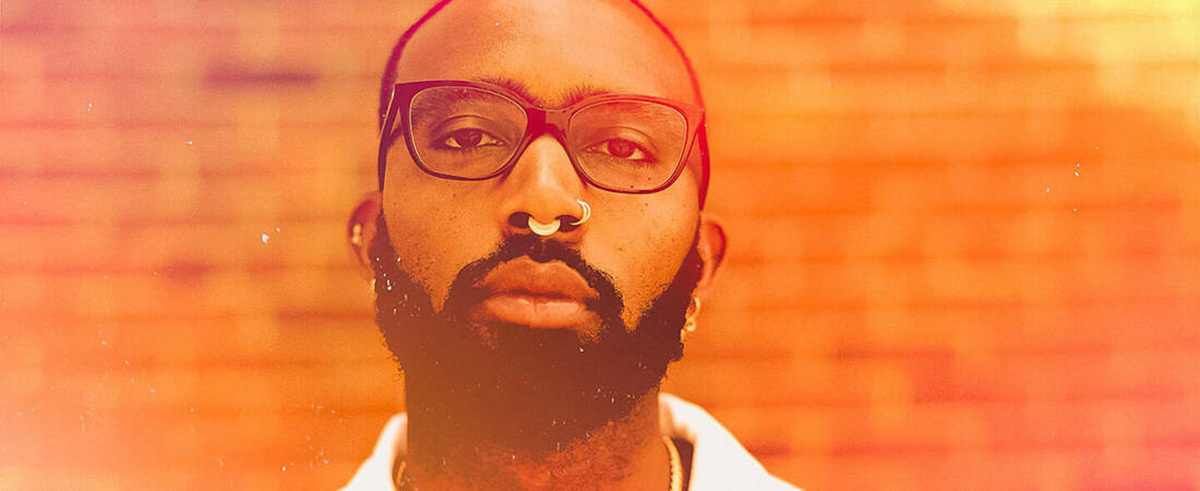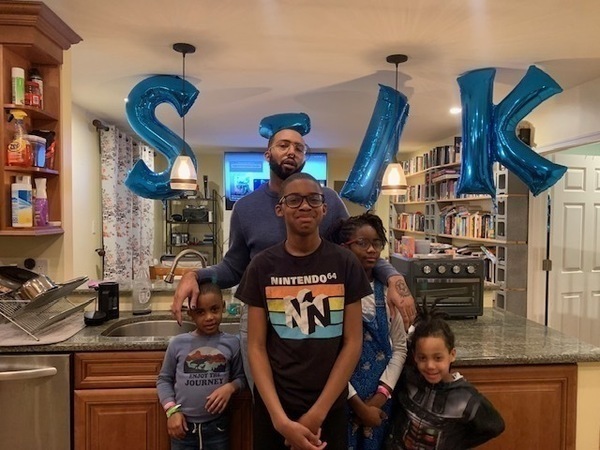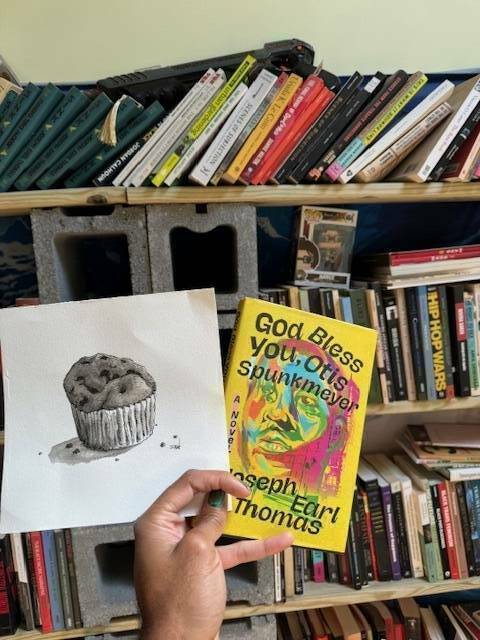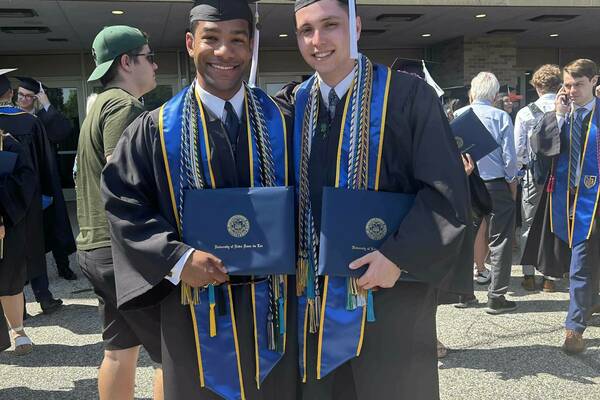
On his way to working in medicine, Joseph Earl Thomas ’19 MFA decided to become a writer instead.
Since he was young, Thomas had an affinity for the arts. He loved to draw and immersed himself in the worlds that visual arts and animations brought to life. Through cartoons and video games, Pokémon and anime, and all things science fiction and fantasy, Thomas found solace creating. It wasn't until later that writing would enter his radar, but drawing laid the foundation for his creative career.
After graduating high school at 17, Thomas began taking science classes at Community College of Philadelphia in preparation to become a physician assistant. In addition to school work, he was juggling four jobs — the stress ultimately forcing him to explore other options.
At 19, Thomas joined the Army National Guard and deployed as a medic and EMT, serving for 13 years. He was sent to Baghdad, where he provided medical treatment and gained practical experience in treating patients. He hoped to use the time, money, and space the military provided to carve out his future.
“I didn’t come from a household where most people graduated high school or had a college degree,” he said. “That was part of why I went to the Army.”
With the financial support, he enrolled at Arcadia University and continued working towards a career in medicine while also exploring his options academically — taking a few poetry and literature classes on the side. Although writing didn’t have much of a place within Thomas' plan, he did find enjoyment in the classes, and he was good at it.
“I was into them, but I wasn’t taking them as seriously as, you know, this is who I am or what I’m going to do,” Thomas said.
Thomas went on to complete his military service and earn his degree in biology before he was accepted into physician assistant school at Drexel University in Philadelphia — one step closer to a future in healthcare. However, after taking a summer class in African American literature at the neighboring St. Joseph’s University, Thomas’ career trajectory changed. His talent for writing pivoted from an afterthought to an ambition.

“I was really into [the writing classes],” he said. “And I became really disenchanted with going to school for medicine and wanted to do something else, to think beyond pre-existing paradigms.”
Aisha Lockridge, associate professor of communication and media studies at St. Joseph’s, whose influence was instrumental in Thomas' decision to pursue the arts, noticed his aptitude for writing and explained the process of graduate school.
“I didn’t understand that in the humanities, you could write a sample and get into a place that was funded,” Thomas said. Coming from the rigid structure of the sciences, that concept felt foreign to him. Nonetheless, he was interested.
Thomas ended up taking the risk and leaving medicine, pursuing an M.A. in Writing Studies at St. Joseph’s and preparing himself to apply to MFA and Ph.D. programs.
Thomas weighed many factors when deciding where to earn his MFA.
“I wanted to be somewhere away from the city. Big city life is not really conducive to thinking for me,” he said.
Naturally, Notre Dame fit the bill. More important to Thomas was the faculty. He resonated with the Notre Dame Creative Writing Program and community because of their authenticity.
His application made it into the hands of Dr. Roy Scranton, who would later become his mentor. Scranton recalls how excited he was reading Thomas’ writing and learning about his life. “His stories were propulsive and engaging. They were just fantastic,” Scranton said. “Learning more about him and who he was, and his long journey to this point of applying to MFA, was fascinating.”
Thomas resonated with Scranton’s background, which he recognized wasn't often found in academia: Scranton was also a veteran of the American occupation of Iraq. Further, Thomas saw that Scranton’s work was less interested in being a ‘commercial product’ and more concerned with thinking and feeling — which he also hoped his writing would inspire.
“It was important for me to find somebody who had come from a similar class background because there’s so few of those people in academia at all,” Thomas said.
A formative moment for Thomas was when Scranton told him that his writing needed more work. He found his honesty both exciting and rewarding because it pushed him to be better, to mold words in new ways. At the same time, Scranton was also learning from Thomas.
“He has the kind of mind where he’s thinking in narrative, thinking in image, thinking in sound, but he’s also thinking in ideas and in critical analysis, and philosophically,” Scranton said.

As a student in Scranton’s MFA workshop, Thomas used his “curious and lightning-fast mind,” as Scranton described, to create compelling language. Thomas' thesis, which became his first book, Sink, was one of those pieces that was both powerful and challenging.
Sink, a third-person narrative of Thomas’ turbulent childhood, published in February 2023, has received high acclaim. It was chosen as one of the New York Times’ 100 Notable Books of 2023, BET’s Favorite Memoirs of 2023, Electric Literature’s Favorite Books of 2023, and was long-listed for the PEN/Jean Stein Award.
Thomas grew up in Frankford, a Philadelphia neighborhood where encounters with racism, abuse, and economic struggles greatly shaped his identity. Sink explores Thomas' childhood and the influence of “geek culture” in his journey to self-discovery. He hopes his memoir highlights that while many are afflicted with poverty, the impoverishment of “social resources” — whether they be healthy family dynamics and relationships, access to good teachers and schools, or social workers — contributes to the struggle.
“I wanted to write a book that was about the failure of those systems, rather than the failures of individual people for not having enough money — it’s more complicated than that,” Thomas said.
Finding the right words to do this is no small feat and, for Thomas, that sometimes leads to arguments and long conversations with himself in the shower. “I always play out social situations,” he said. His friends and family frequently ask “Who are you talking to?” He assures them that there’s a method to his mumbling.
Currently, Thomas is writing the novel God Bless You, Otis Spunkmeyer, and a collection of stories, Leviathan Beach, amongst other projects. He is finishing his final year of his Ph.D. at the University of Pennsylvania and will be a faculty member in creative writing at Sarah Lawrence College in New York.
Being able to create a sentence that is moving and funny is challenging. Translating complex feelings and emotions into words is even more so. But, wrestling with the language to get there is deeply satisfying for Thomas.
“Writing,” Thomas said, “is one of the most difficult and pleasurable things I’ve ever done in my life.”
Originally published by Amanda Pilarski at weare.nd.edu, a digital publication from the Notre Dame Alumni Association telling stories of Domers doing good in the world.


